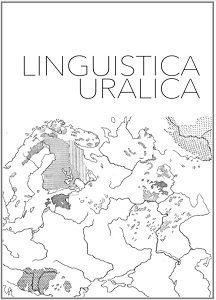Русский след в некоторых удмуртских словах: о происхождении лексем вай, ӝожон, зол, нет, туж
Russian Trace in Some Udmurt Words: on the Origin of the Lexemes вай, ӝожон, зол, нет, and туж
Author(s): Sergei A. MaksimovSubject(s): Morphology, Lexis, Finno-Ugrian studies
Published by: Teaduste Akadeemia Kirjastus
Keywords: Udmurt language; Permic languages; language contacts; etymology; Russian, Proto-Slavic/Para-Baltoslavic borrowings;
Summary/Abstract: Russian borrowed vocabulary in Udmurt is well studied. A series of articles is devoted to this scientific topic, two doctoral dissertations have been defended, books and monographs were published. It is not difficult for a speaker of Russian to identify the majority of Russian borrowings. However, there is a group of words, mainly old borrowings, which have experienced phonetic adaptation and semantic changes. It requires considerable effort to identify such words as Russian borrowings and find their etymon. This article is devoted to the study of the origin of such lexical units, namely: вай ’branch, bough’, ӝожон ’fried oat flour, and a dish prepared from it’, зол ’strong; strongly’, нет ’whim, caprice, capricious (absurd) desire; wish’, туж ’very’. The previously proposed etymologies of the words вай, нет and туж are clearly incorrect, other words require clarification of the source and additional description of phonetic adaptation and semantic changes. So, зол ’strong; strongly’ is traditionally considered a word of Common Permic origin. We assume that this word is not primordial, but borrowed from a Slavic type language - Proto-Slavic or Para-Baltoslavic in the Pre-Permian era.
Journal: Linguistica Uralica
- Issue Year: LVIII/2022
- Issue No: 1
- Page Range: 48-57
- Page Count: 10
- Language: Russian

